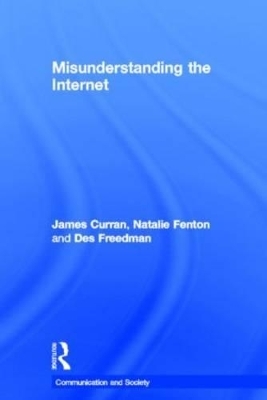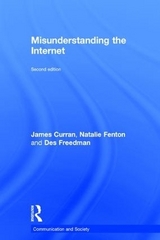
Misunderstanding the Internet
Routledge (Verlag)
978-0-415-57956-8 (ISBN)
- Titel erscheint in neuer Auflage
- Artikel merken
However, much popular and academic writing about the internet takes a technologically deterministic view, assuming that the internet’s potential will be realised in essentially transformative ways. This was especially true in the euphoric moment of the mid-1990s, when many commentators wrote about the internet with awe and wonderment. While this moment may be over, its underlying technocentrism – the belief that technology determines outcomes – lingers on, and with it, a failure to understand the internet in its social, economic and political context.
Misunderstanding the Internet is a short introduction, encompassing the history, sociology, politics and economics of the internet and its impact on society. The book has a simple three part structure:
Part 1 looks at the history of the internet, and offers an overview of the internet’s place in society
Part 2 focuses on the control and economics of the internet
Part 3 examines the internet’s political and cultural influence
Misunderstanding the Internet is a polemical, sociologically and historically informed textbook that aims to challenge both popular myths and existing academic orthodoxies around the internet.
James Curran is Professor of Communication at Goldsmiths, University of London, and is Director of the Goldsmiths Leverhulme Media Research Centre. He has written or edited 21 books about the media, including Power Without Responsibility (with Jean Seaton), now in its seventh edition, Media and Society now in its fifth edition, and Media and Power, translated into five languages. He has been a visiting professor at California, Penn, Stanford, Oslo and Stockholm Universities. James Curran is the 2011 winner of the ICA's C. Edwin Baker Award for the Advancement of Scholarship on Media, Markets and Democracy. Natalie Fenton is Professor of Media and Communication at Goldsmiths, University of London where she is also Co-Director of the Goldsmiths Media Research Centre: Spaces, Connections, Control, and Co-Director of Goldsmiths Centre for the Study of Global Media and Democracy. She has published widely on issues relating to media, politics and new media and is particularly interested in rethinking understandings of public culture, the public sphere and democracy. Des Freedman is a Reader in Communications and Cultural Studies at Goldsmiths, University of London. He is the author of The Politics of Media Policy (2008), co-editor of Media and Terrorism: Global Perspectives (2011) and one of the UK representatives on the management committee of the COST A20 project that examined the impact of the internet on the mass media. He is a co-editor of the journal Global Media and Communication and a researcher in the Goldsmiths Leverhulme Media Research Centre.
Part I Overview Chapter 1 Reinterpreting the Internet, James Curran Chapter 2 Rethinking Internet History, James Curran Part II Political Economy of the Internet Chapter 3 Web 2.0 and the Death of the Blockbuster Economy, Des Freedman Chapter 4 Outsourcing Internet Regulation, Des Freedman Part III Internet and Power Chapter 5 Internet and Social Networking, Natalie Fenton Chapter 6 Internet and Radical Politics, Natalie Fenton, Part IV Looking Forward Chapter 7 Conclusion, James Curran, Des Freedman and Natalie Fenton
| Erscheint lt. Verlag | 6.3.2012 |
|---|---|
| Reihe/Serie | Communication and Society |
| Verlagsort | London |
| Sprache | englisch |
| Maße | 156 x 234 mm |
| Gewicht | 456 g |
| Themenwelt | Sozialwissenschaften ► Kommunikation / Medien ► Medienwissenschaft |
| Sozialwissenschaften ► Soziologie | |
| ISBN-10 | 0-415-57956-2 / 0415579562 |
| ISBN-13 | 978-0-415-57956-8 / 9780415579568 |
| Zustand | Neuware |
| Haben Sie eine Frage zum Produkt? |
aus dem Bereich



